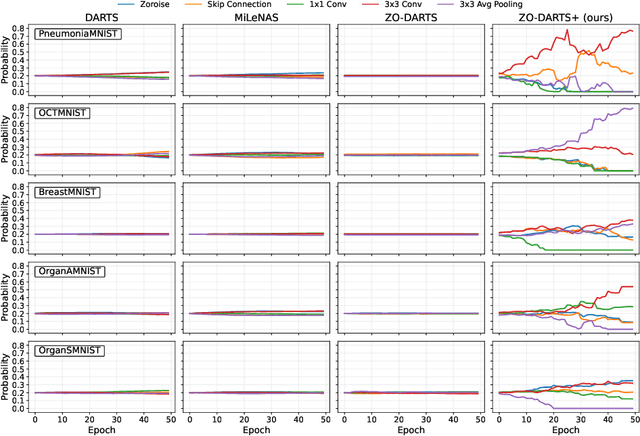Lunchen Xie
ZO-DARTS++: An Efficient and Size-Variable Zeroth-Order Neural Architecture Search Algorithm
Mar 08, 2025Abstract:Differentiable Neural Architecture Search (NAS) provides a promising avenue for automating the complex design of deep learning (DL) models. However, current differentiable NAS methods often face constraints in efficiency, operation selection, and adaptability under varying resource limitations. We introduce ZO-DARTS++, a novel NAS method that effectively balances performance and resource constraints. By integrating a zeroth-order approximation for efficient gradient handling, employing a sparsemax function with temperature annealing for clearer and more interpretable architecture distributions, and adopting a size-variable search scheme for generating compact yet accurate architectures, ZO-DARTS++ establishes a new balance between model complexity and performance. In extensive tests on medical imaging datasets, ZO-DARTS++ improves the average accuracy by up to 1.8\% over standard DARTS-based methods and shortens search time by approximately 38.6\%. Additionally, its resource-constrained variants can reduce the number of parameters by more than 35\% while maintaining competitive accuracy levels. Thus, ZO-DARTS++ offers a versatile and efficient framework for generating high-quality, resource-aware DL models suitable for real-world medical applications.
A Lightweight Neural Architecture Search Model for Medical Image Classification
May 06, 2024

Abstract:Accurate classification of medical images is essential for modern diagnostics. Deep learning advancements led clinicians to increasingly use sophisticated models to make faster and more accurate decisions, sometimes replacing human judgment. However, model development is costly and repetitive. Neural Architecture Search (NAS) provides solutions by automating the design of deep learning architectures. This paper presents ZO-DARTS+, a differentiable NAS algorithm that improves search efficiency through a novel method of generating sparse probabilities by bi-level optimization. Experiments on five public medical datasets show that ZO-DARTS+ matches the accuracy of state-of-the-art solutions while reducing search times by up to three times.
An Efficient Learning Framework For Federated XGBoost Using Secret Sharing And Distributed Optimization
May 12, 2021



Abstract:XGBoost is one of the most widely used machine learning models in the industry due to its superior learning accuracy and efficiency. Targeting at data isolation issues in the big data problems, it is crucial to deploy a secure and efficient federated XGBoost (FedXGB) model. Existing FedXGB models either have data leakage issues or are only applicable to the two-party setting with heavy communication and computation overheads. In this paper, a lossless multi-party federated XGB learning framework is proposed with a security guarantee, which reshapes the XGBoost's split criterion calculation process under a secret sharing setting and solves the leaf weight calculation problem by leveraging distributed optimization. Remarkably, a thorough analysis of model security is provided as well, and multiple numerical results showcase the superiority of the proposed FedXGB compared with the state-of-the-art models on benchmark datasets.
Efficient Algorithms for Rotation Averaging Problems
Mar 18, 2021



Abstract:The rotation averaging problem is a fundamental task in computer vision applications. It is generally very difficult to solve due to the nonconvex rotation constraints. While a sufficient optimality condition is available in the literature, there is a lack of \yhedit{a} fast convergent algorithm to achieve stationary points. In this paper, by exploring the problem structure, we first propose a block coordinate descent (BCD)-based rotation averaging algorithm with guaranteed convergence to stationary points. Afterwards, we further propose an alternative rotation averaging algorithm by applying successive upper-bound minimization (SUM) method. The SUM-based rotation averaging algorithm can be implemented in parallel and thus is more suitable for addressing large-scale rotation averaging problems. Numerical examples verify that the proposed rotation averaging algorithms have superior convergence performance as compared to the state-of-the-art algorithm. Moreover, by checking the sufficient optimality condition, we find from extensive numerical experiments that the proposed two algorithms can achieve globally optimal solutions.
 Add to Chrome
Add to Chrome Add to Firefox
Add to Firefox Add to Edge
Add to Edge